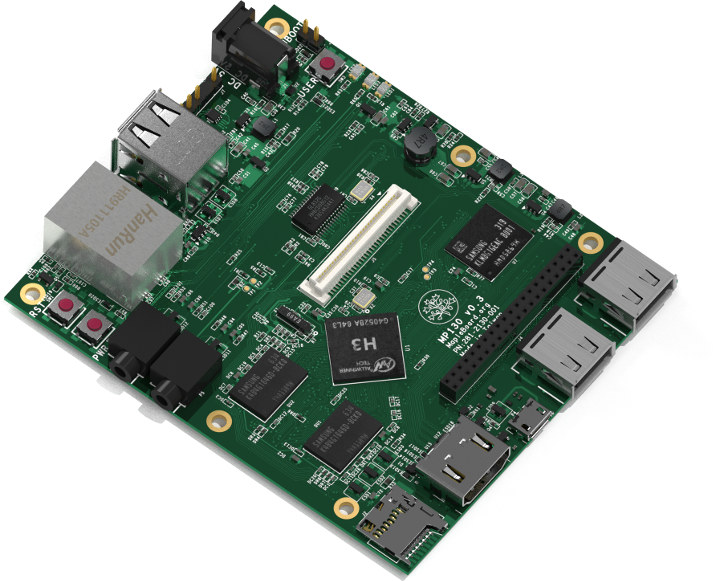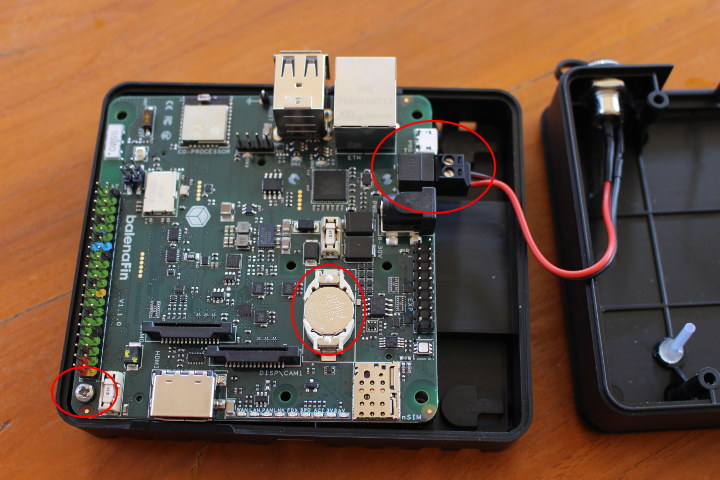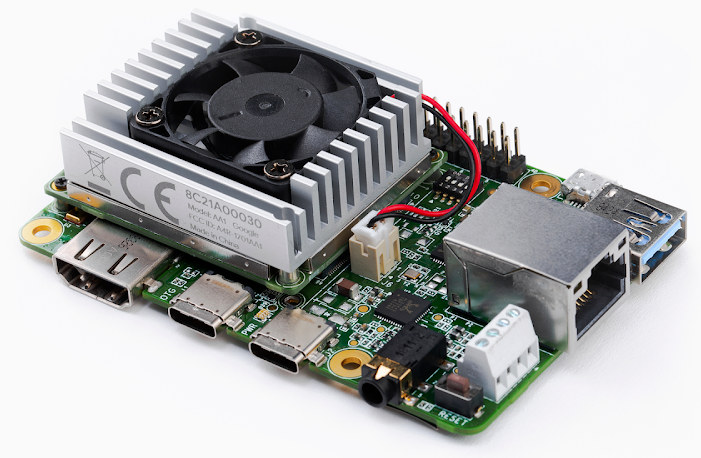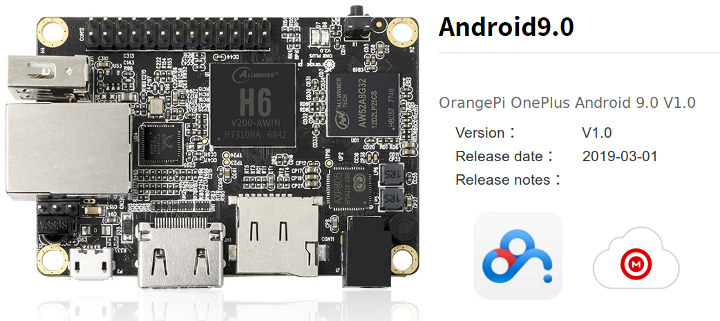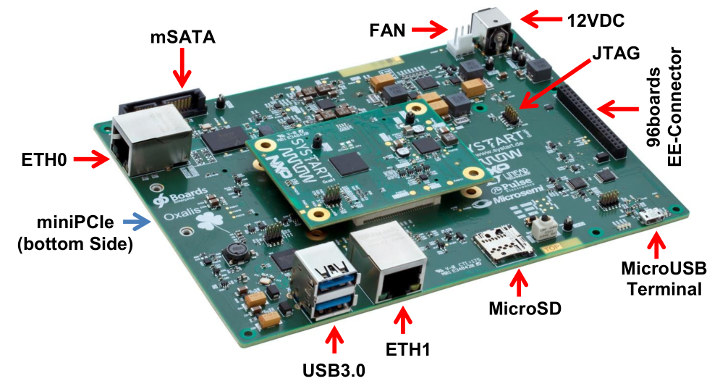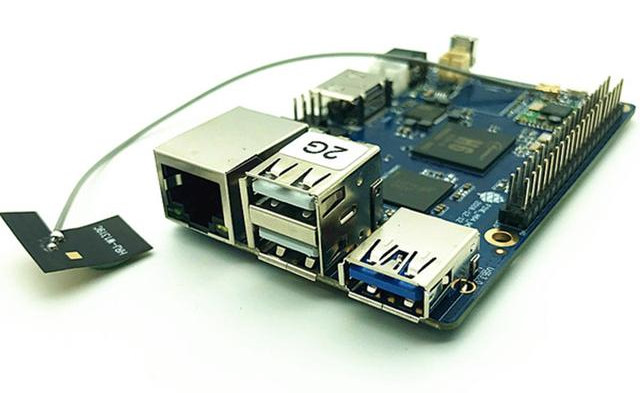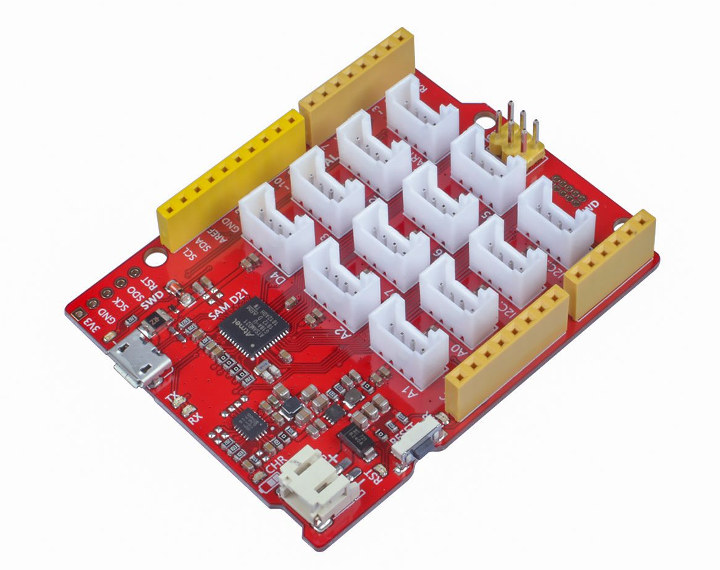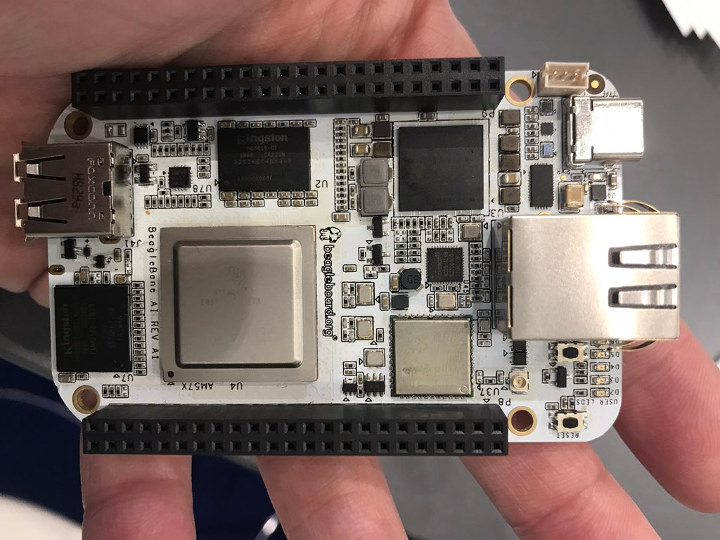There are so many Allwinner H3 SBCs or development boards that new ones are often uninteresting, but with the release of Linux 5.0, I discovered a new board that I had never heard of: MapleBoard MP130. The board is equipped with 1GB RAM, Fast Ethernet, four USB ports, and various I/O expansion headers. But the form factor looked familiar, and it seems compliant with 96Boards CE Extended, except for some reasons they decided to swap the low speed and high speed connectors, so I doubt the board is compatible with any of the 96Boards mezzanines. MapleBoard MP130 specifications: SoC – Allwinner H3 quad core Arm Cortex-A7 processor at up to 1.3GHz with Mali-400MP2 GPU System Memory – 1GB DDR3L 1600 MHz Storage – 8GB eMMC 4.41 flash, microSD slot Video Output – HDMI 1.4 output with HDCP1.2 Connectivity – 10/100Mbps Ethernet Audio 2-ch 92dB ADC, 2-ch 100dB DAC, I2S/PCM Interface, […]
balenaFin Developer Kit Review – Part 1: Unboxing and Assembly Instructions
Balena launched balenaFin 1.1 at the end of last month. The board is a professional carrier board for Raspberry Pi Compute Module 3 / 3+ Lite that includes support for variable voltage power input, optional PoE, industrial eMMC flash storage, a real-time Arm Cortex-M4 core via Artik-020 module, and more. Somehow a balenaFin 1.1 developer kit ended up in my home, and I’ll play with it in several weeks, but in the first part of the review, I’ll just check out the content of the package, and show how to assemble the kit. BalenaFin 1.1 Developer Kit Unboxing The local courier brought a largish balena Fin package. which contained a smaller balenaFin package, and the actual developer kit. Everything is nicely packaged in the box with the part related to power supply in a white box, a small opening for smaller accessories and Raspberry Pi Compute Module 3, as well […]
Google to Launch Edge TPU Powered Coral Development Board and USB Accelerator
Several low power neural network accelerators have been launched over the recent years in order to accelerator A.I. workloads such as object recognition, and speech processing. Recent announcements include USB devices such as Intel Neural Compute Stick 2 or Orange Pi AI Stick2801. I completely forgot about it, but Google also announced their own Edge TPU ML accelerator, development kit, and USB accelerator last summer. The good news is that Edge TPU powered Coral USB accelerator and Coral dev board and are going to launch in the next few days for respectively $74.99 and $149.99. Coral Development Board Coral dev board is comprised of a base board and SoM wit the following specifications: Edge TPU Module SoC – NXP i.MX 8M quad core Arm Cortex-A53 processor with Arm Cortex-M4F real-time core, GC7000 Lite 3D GPU ML accelerator – Google Edge TPU coprocessor delivering up to 4 TOPS System Memory – […]
Orange Pi Software Releases – Android 9.0 Firmware, Linux Source Code for RK3399 / MT6737
Shenzhen Xunlong Software is used to release many different variations of their Orange Pi boards, and more often than not they tend to launch their boards fairly early before the software is fully ready. Many of their boards get supported by the community thanks to Armbian, linux-sunxi, etc… but sometimes the company does release firmware or source code themselves, as they did in the last two days with Android 9.0 firmware for one of their Allwinner H6 board, and Linux source code for Orange Pi 4G-IoT and Orange Pi RK3399. Android 9.0 for Orange Pi One Plus Launched in 2017, Orange Pi One Plus was the very first Allwinner H6 SBC launched on the market, and supported Android 7.0 at the time. But following the release of Android 9.0 for Allwinner H6 TV boxes a few weeks ago, you can now also upgrade your Orange Pi One Plus to Android […]
Oxalis 96Boards Enterprise Edition Board Targets Low Power IoT and Networking Applications
Most 96Boards on the market follow 96Boards Consumer Edition (CE) specification, and while 96Board Enterprise Edition (EE) specification was first announced in 2015 we had yet to have a board available for purchase after previous failed attempts with AMD Opteron (Arm Cortex-A57) powered Cello board. But there’s finally a 96Board Enterprise Edition available today thanks to Systart Oxalis board powered by NXP LayerScape LS1202 Cortex-A53 processor with a packet accelerator, designed for low power IoT and networking applications, and following 96Boards EE “standard” form factor. Systart Oxalis key features and specifications: SoC – NXP Layerscape LS1012A single core Arm Cortex-A53 processor with hardware packet forwarding engine System Memory – Up to 3GB RAM Storage – 64MB SPI Flash for bootloader and RCW, MicroSD Card slot, 1x mSATA connector Networking – 2x Gigabit Ethernet ports (RJ45) USB – 2x USB 3.0 ports Expansion 40-pin low speed (LS) expansion connector with +1.8V, […]
PINE H64 Model B SBC Launched with Raspberry Pi Form Factor
Pine H64 development board was introduced about a year ago with an Allwinner H6 processor, 1 to 3GB RAM, Gigabit Ethernet, a USB 3.0 port, a PCIe socket, and more with the legacy Pine A64 form factor and price starting at $25.99 for the 1GB RAM version. However, Pine64 made a few announcements at FOSDEM 2019, and beside the upcoming Pinebook Pro Linux/*BSD laptop, the company also mentioned a new PINE H64 Model B, still based on Allwinner H6 processor, but instead following Raspberry Pi form factor also used by the company’s Rock64 SBC. The new board is still not available on the official Pine64 store, but Ameridroid is already taking orders for Pine H64 Model B for $38.95 (2GB RAM) and $48.95 (3GB RAM). Pine H64 Model B specifications: SoC – Allwinner H6 quad-core Arm Cortex-A53 processor @ 1.8GHz with Arm Mali T-722MP2 dual-core GPU supporting OpenGL ES 3.1/3.0/2.0/1.1, […]
Seeeduino Lotus Cortex-M0+ is a $10 Arduino compatible Board with 12 Grove Connectors
Grove modules are cool little add-on boards that connect through 4-pin header using UART, I2C, analog or digital I/Os, and usually you’d need to buy a HAT or shield to connect them to respectively Raspberry Pi or Arduino board. But Seeed Studio has come up with a small Arduino compatible board based on Microchip SAMD21 microcontroller called Seeeduino Lotus Cortex-M0+ that may be the cheapest “Grove” solution around as it sells for just $9.90. Seeeduino Lotus Cortex-M0+ specifications: MCU – Microchip Atmel SAMD21 Arm Cortex-M0+ microcontroller at 48MHz with 256KB Flash and 32KB SRAM as found in Arduino Zero. USB – 1x micro USB port for power and programming Expansion 12x on-board Grove connectors (6x Digital, 3x Analog, 1x UART and 2x I2C) Arduino UNO headers 14x Digital I/O Pins (10 PWM outputs) 6x Analog Inputs I/O pins are 3.3V, do not input more than 3.3V, otherwise the CPU may […]
TI AM5729 Powered BeagleBone-AI Comes with TI C66x DSP and EVE Cores
Launched in 2013, BeagleBone Black is still one of the most popular hobbyist board thanks to its many I/Os, software support, and affordable price with being the cheapest board around those days. But it looks like we’ll soon have a new version that allows to experiment with artificial intelligence workloads. BeagleBone-AI is powered by Texas Instruments AM5729 SoC equipped with TI C66x digital-signal-processor (DSP) cores and embedded-vision-engine (EVE) cores supported through a TIDL (Texas Instruments Deep Learning) machine learning OpenCL API. BeagleBone-AI preliminary specifications: SoC – TI AM5729 dual core Cortex-A15 processor featuring 4 PRUs, Dual core C66x DSP, and 4 EVEs System Memory – 1GB RAM Storage – 16GB on-board eMMC flash with high-speed interface Networking – Gigabit Ethernet and high-speed WiFi SB – 1x USB type-C for power and superspeed dual-role controller, 1x USB type-A host Expansion – BeagleBone Black (BBB) compatible headers Dimensions – 86.4 x 53.4 […]


